Unit 4 Don't eat in class. SectionB 同步测试题(含解析)
文档属性
| 名称 | Unit 4 Don't eat in class. SectionB 同步测试题(含解析) |
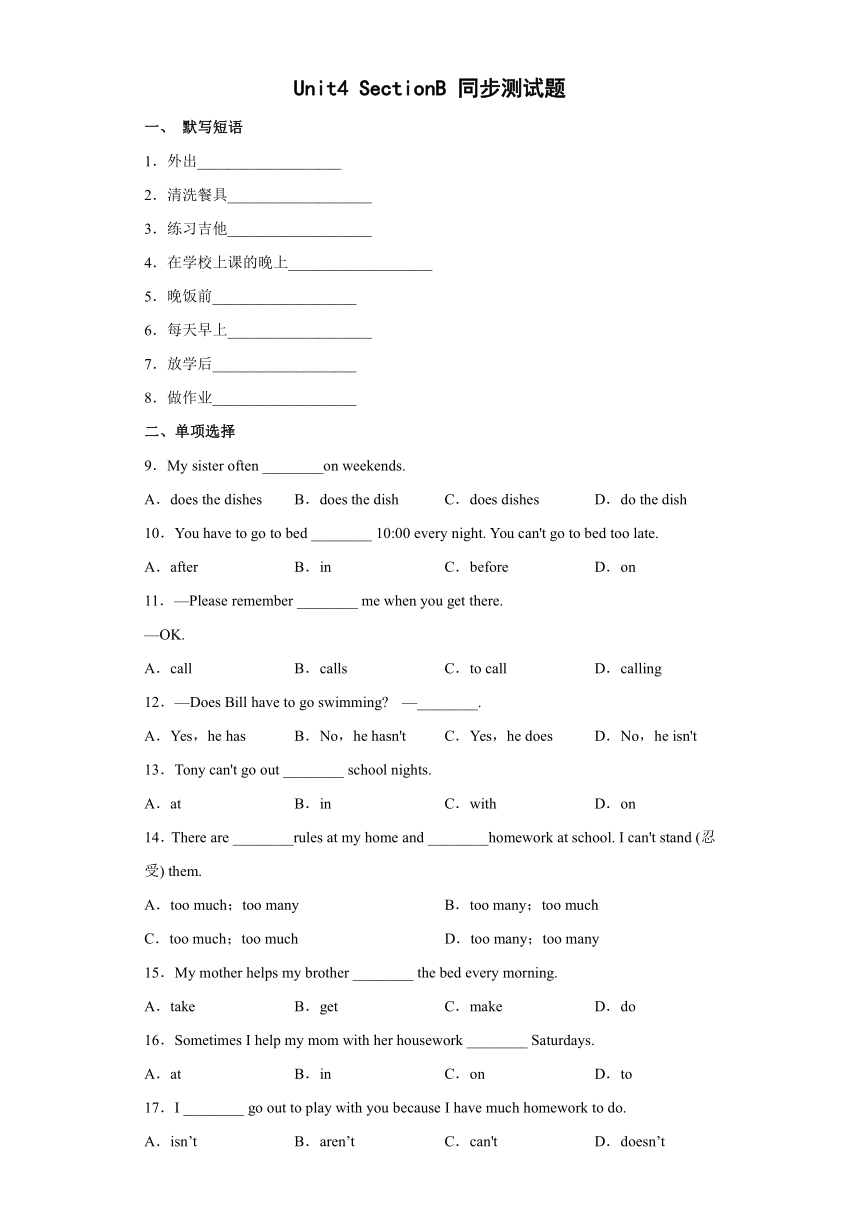
|
|
| 格式 | docx | ||
| 文件大小 | 33.7KB | ||
| 资源类型 | 教案 | ||
| 版本资源 | 人教新目标(Go for it)版 | ||
| 科目 | 英语 | ||
| 更新时间 | 2023-03-15 00:00:00 | ||
图片预览

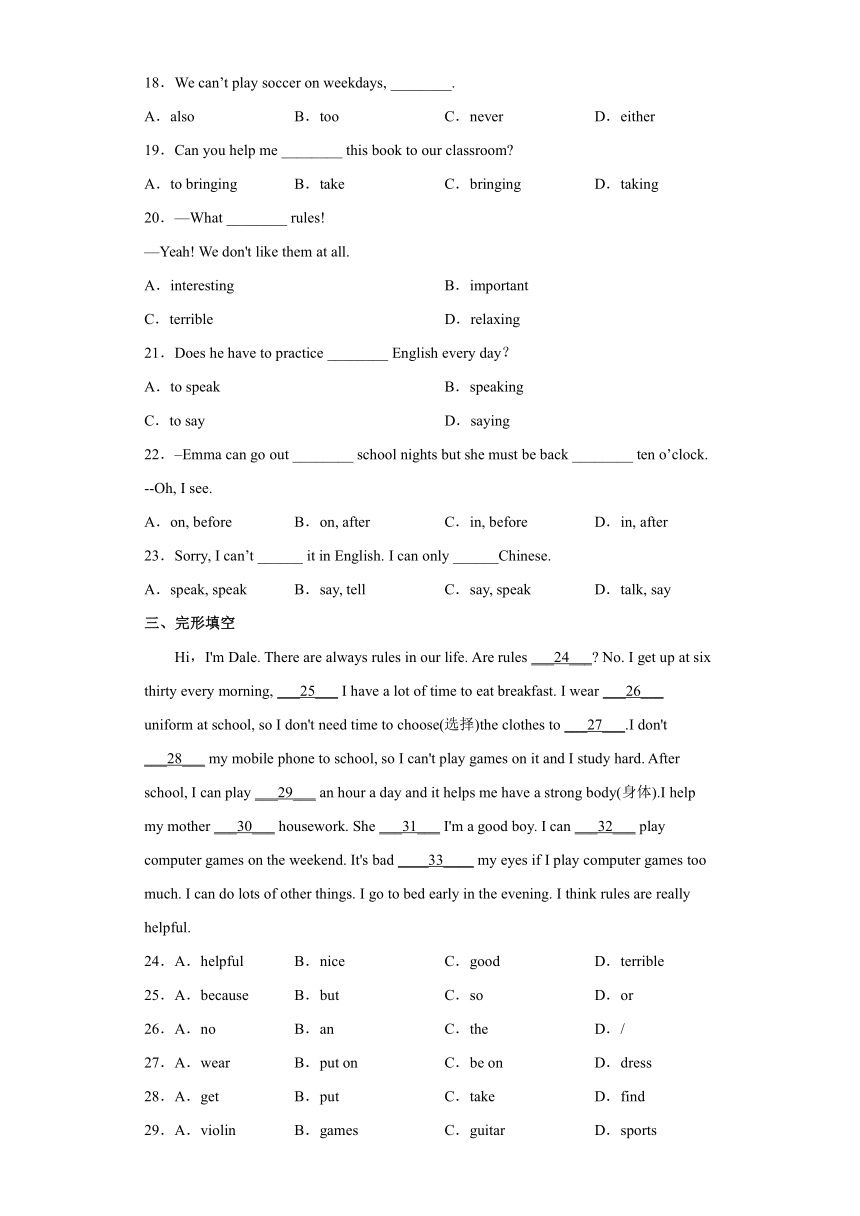
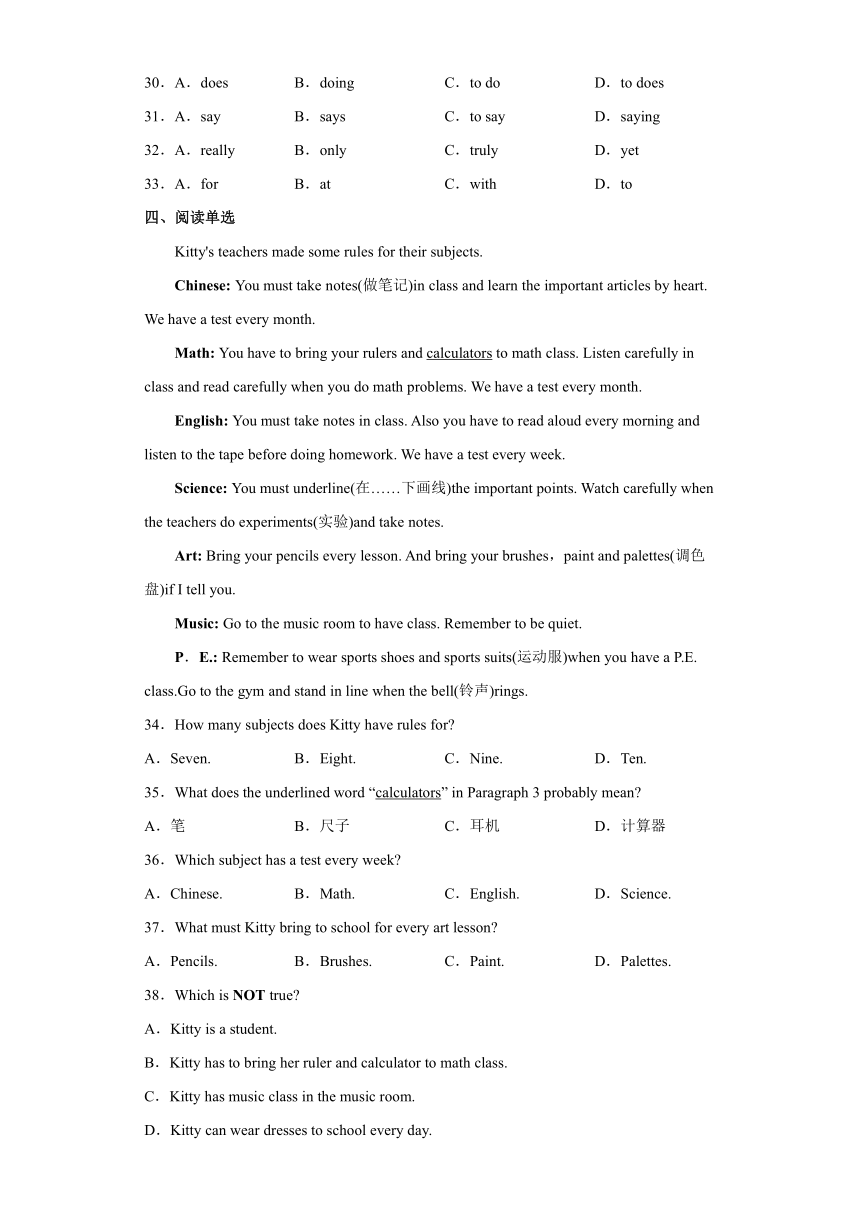
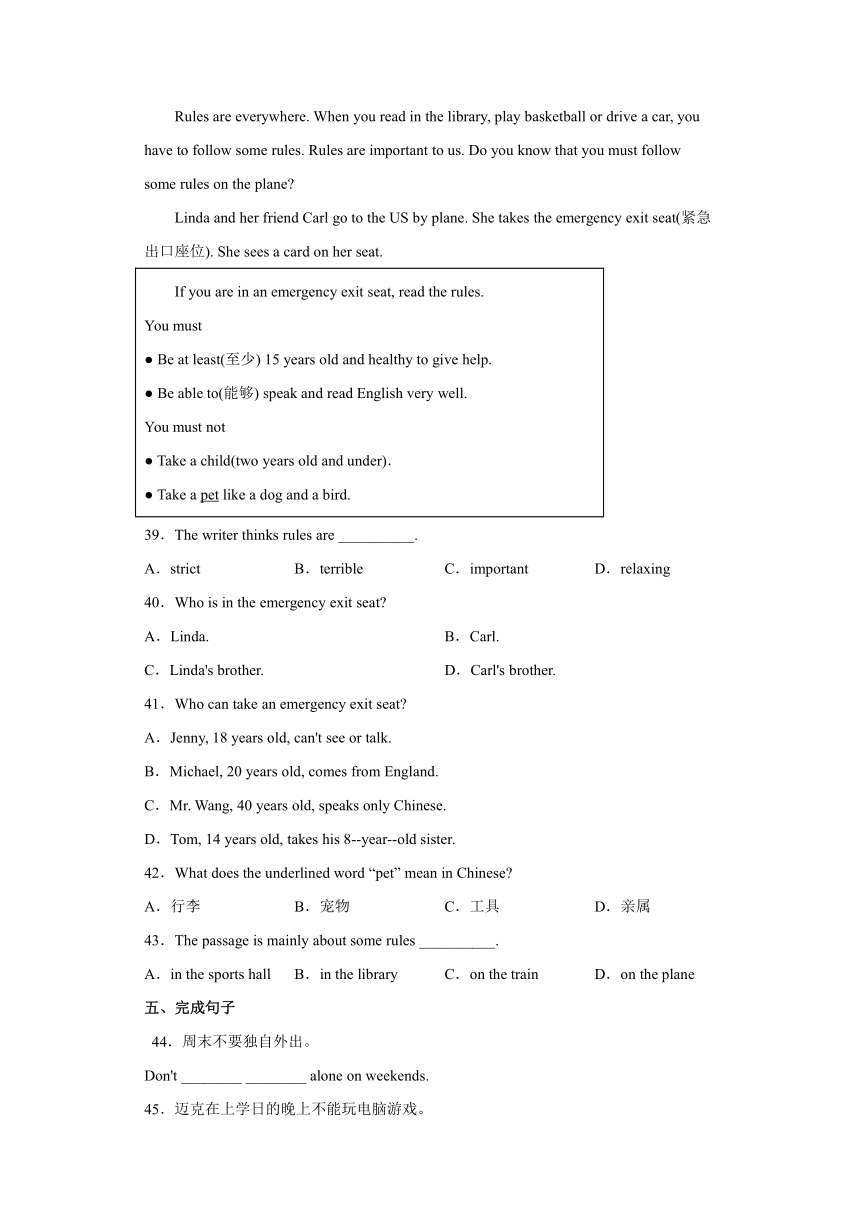
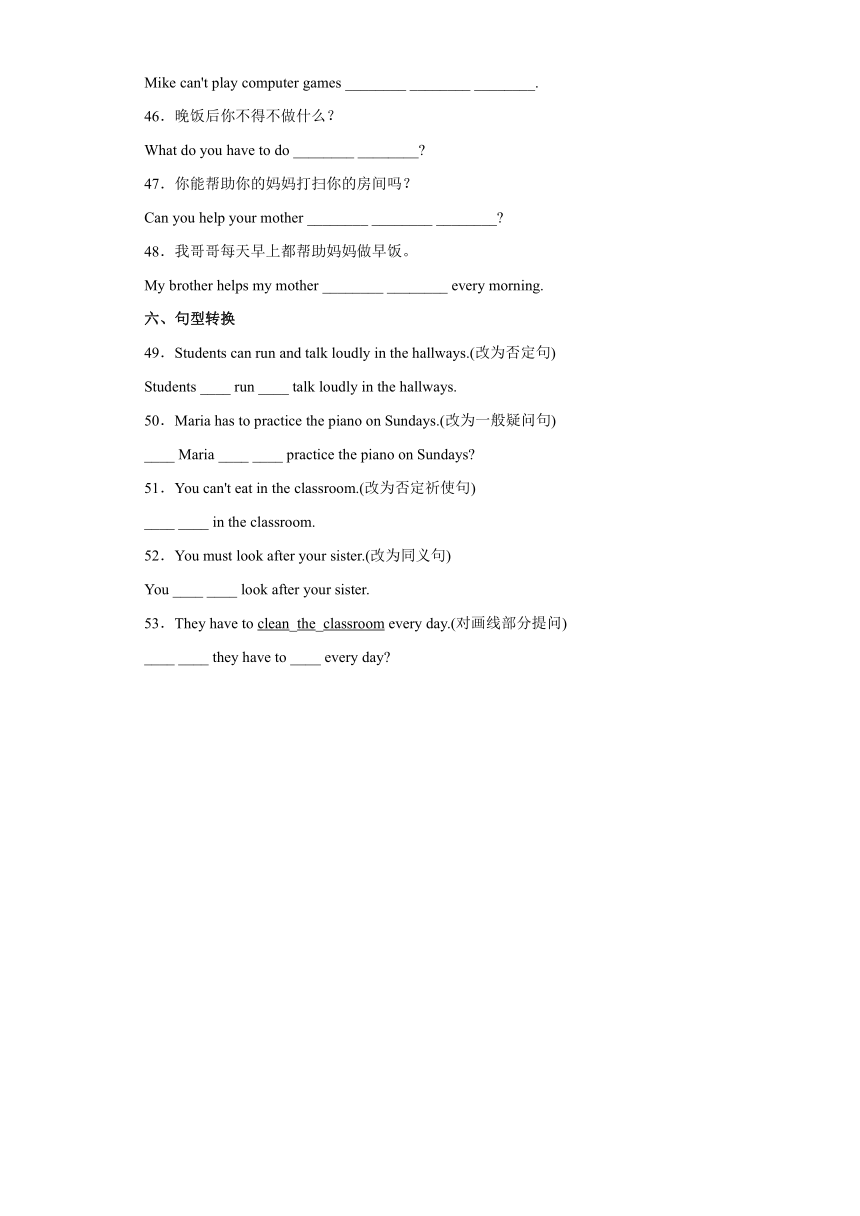
文档简介
Unit4 SectionB 同步测试题
默写短语
1.外出___________________
2.清洗餐具___________________
3.练习吉他___________________
4.在学校上课的晚上___________________
5.晚饭前___________________
6.每天早上___________________
7.放学后___________________
8.做作业___________________
二、单项选择
9.My sister often ________on weekends.
A.does the dishes B.does the dish C.does dishes D.do the dish
10.You have to go to bed ________ 10:00 every night. You can't go to bed too late.
A.after B.in C.before D.on
11.—Please remember ________ me when you get there.
—OK.
A.call B.calls C.to call D.calling
12.—Does Bill have to go swimming —________.
A.Yes,he has B.No,he hasn't C.Yes,he does D.No,he isn't
13.Tony can't go out ________ school nights.
A.at B.in C.with D.on
14.There are ________rules at my home and ________homework at school. I can't stand (忍受) them.
A.too much;too many B.too many;too much
C.too much;too much D.too many;too many
15.My mother helps my brother ________ the bed every morning.
A.take B.get C.make D.do
16.Sometimes I help my mom with her housework ________ Saturdays.
A.at B.in C.on D.to
17.I ________ go out to play with you because I have much homework to do.
A.isn’t B.aren’t C.can't D.doesn’t
18.We can’t play soccer on weekdays, ________.
A.also B.too C.never D.either
19.Can you help me ________ this book to our classroom
A.to bringing B.take C.bringing D.taking
20.—What ________ rules!
—Yeah! We don't like them at all.
A.interesting B.important
C.terrible D.relaxing
21.Does he have to practice ________ English every day?
A.to speak B.speaking
C.to say D.saying
22.–Emma can go out ________ school nights but she must be back ________ ten o’clock.
--Oh, I see.
A.on, before B.on, after C.in, before D.in, after
23.Sorry, I can’t ______ it in English. I can only ______Chinese.
A.speak, speak B.say, tell C.say, speak D.talk, say
三、完形填空
Hi,I'm Dale. There are always rules in our life. Are rules ___24___ No. I get up at six thirty every morning, ___25___ I have a lot of time to eat breakfast. I wear ___26___ uniform at school, so I don't need time to choose(选择)the clothes to ___27___.I don't ___28___ my mobile phone to school, so I can't play games on it and I study hard. After school, I can play ___29___ an hour a day and it helps me have a strong body(身体).I help my mother ___30___ housework. She ___31___ I'm a good boy. I can ___32___ play computer games on the weekend. It's bad ____33____ my eyes if I play computer games too much. I can do lots of other things. I go to bed early in the evening. I think rules are really helpful.
24.A.helpful B.nice C.good D.terrible
25.A.because B.but C.so D.or
26.A.no B.an C.the D./
27.A.wear B.put on C.be on D.dress
28.A.get B.put C.take D.find
29.A.violin B.games C.guitar D.sports
30.A.does B.doing C.to do D.to does
31.A.say B.says C.to say D.saying
32.A.really B.only C.truly D.yet
33.A.for B.at C.with D.to
四、阅读单选
Kitty's teachers made some rules for their subjects.
Chinese: You must take notes(做笔记)in class and learn the important articles by heart. We have a test every month.
Math: You have to bring your rulers and calculators to math class. Listen carefully in class and read carefully when you do math problems. We have a test every month.
English: You must take notes in class. Also you have to read aloud every morning and listen to the tape before doing homework. We have a test every week.
Science: You must underline(在……下画线)the important points. Watch carefully when the teachers do experiments(实验)and take notes.
Art: Bring your pencils every lesson. And bring your brushes,paint and palettes(调色盘)if I tell you.
Music: Go to the music room to have class. Remember to be quiet.
P.E.: Remember to wear sports shoes and sports suits(运动服)when you have a P.E. class.Go to the gym and stand in line when the bell(铃声)rings.
34.How many subjects does Kitty have rules for
A.Seven. B.Eight. C.Nine. D.Ten.
35.What does the underlined word “calculators” in Paragraph 3 probably mean
A.笔 B.尺子 C.耳机 D.计算器
36.Which subject has a test every week
A.Chinese. B.Math. C.English. D.Science.
37.What must Kitty bring to school for every art lesson
A.Pencils. B.Brushes. C.Paint. D.Palettes.
38.Which is NOT true
A.Kitty is a student.
B.Kitty has to bring her ruler and calculator to math class.
C.Kitty has music class in the music room.
D.Kitty can wear dresses to school every day.
Rules are everywhere. When you read in the library, play basketball or drive a car, you have to follow some rules. Rules are important to us. Do you know that you must follow some rules on the plane
Linda and her friend Carl go to the US by plane. She takes the emergency exit seat(紧急出口座位). She sees a card on her seat.
If you are in an emergency exit seat, read the rules. You must ● Be at least(至少) 15 years old and healthy to give help. ● Be able to(能够) speak and read English very well. You must not ● Take a child(two years old and under). ● Take a pet like a dog and a bird.
39.The writer thinks rules are __________.
A.strict B.terrible C.important D.relaxing
40.Who is in the emergency exit seat
A.Linda. B.Carl.
C.Linda's brother. D.Carl's brother.
41.Who can take an emergency exit seat
A.Jenny, 18 years old, can't see or talk.
B.Michael, 20 years old, comes from England.
C.Mr. Wang, 40 years old, speaks only Chinese.
D.Tom, 14 years old, takes his 8 -year- old sister.
42.What does the underlined word “pet” mean in Chinese
A.行李 B.宠物 C.工具 D.亲属
43.The passage is mainly about some rules __________.
A.in the sports hall B.in the library C.on the train D.on the plane
五、完成句子
44.周末不要独自外出。
Don't ________ ________ alone on weekends.
45.迈克在上学日的晚上不能玩电脑游戏。
Mike can't play computer games ________ ________ ________.
46.晚饭后你不得不做什么?
What do you have to do ________ ________
47.你能帮助你的妈妈打扫你的房间吗?
Can you help your mother ________ ________ ________
48.我哥哥每天早上都帮助妈妈做早饭。
My brother helps my mother ________ ________ every morning.
六、句型转换
49.Students can run and talk loudly in the hallways.(改为否定句)
Students ____ run ____ talk loudly in the hallways.
50.Maria has to practice the piano on Sundays.(改为一般疑问句)
____ Maria ____ ____ practice the piano on Sundays
51.You can't eat in the classroom.(改为否定祈使句)
____ ____ in the classroom.
52.You must look after your sister.(改为同义句)
You ____ ____ look after your sister.
53.They have to clean_the_classroom every day.(对画线部分提问)
____ ____ they have to ____ every day
参考答案:
1.go out 2.clean the dishes 3.practice the guitar 4.on a school night 5.before dinner 6.every morning 7.after school 8.do homework
9.A
句子主语My sister是第三人称单数形式,谓语也用第三人称单数形式,因此,此空故填does the dishes ,BCD短语表达错误,故选A。
10.C
A.在.....之后;B.在.....里;C.意思是在...之前;D.在.....上。根据go to bed 去睡觉可知,此空的.意思是在...之前,故填介词before,故选C。
11.C
考查非谓语动词。remember to do sth记得要做某事,还没做;remember doing sth记得做过某事,已经做了。根据“when you get there”可知,事情还没做,要做。故选C。
12.C
本句是以does开头的一般疑问句,does是助动词,肯定或否定回答都要用助动词does。因此,此空应填Yes,he does。ABD表达有误。故选C。
13.D
考查介词辨析。at在,后面加具体的时刻;in在,后面加月份、季节、年份或早上、晚上等;with和;on在,后面加具体某一天或具体某一天的早上、晚上等。根据“school nights”可知,是具体的上学日的晚上。故选D。
14.B
我受不了它们。too many修饰可数名词复数;too much修饰不可数名词。第一空后rules是可数名词复数,故用too many;故排除A和C;第二空后homework是不可数名词,故用too much。故排除D,根据句意可知,故选B。
15.C
考查动词辨析。take带走;get得到;make制作;do做。根据句意可知,本题考查动词短语make the bed“铺床”,故填C。
16.C
考查介词辨析。at表示“某一具体时刻(即几点几分时)”;in后跟年份、月份和季节等;on表示“在具体的某一天”或“(在具体的某一天的)早上、中午、晚上”;to表示差几分钟到几点。由后面的Saturdays,可知指的是具体的某一天,因此用介词on,故选C。
17.C
考查情态动词。isn’t不是;aren’t不是;can't不能;doesn’t不。根据“I have much homework to do”有很多的作业要去做,可知应是不能出去玩,主语是I,选项ABD都不能用于I之后,因此应用情态动词can't,后接动词原形,故选C。
18.D
考查副词辨析。also常用于肯定句或疑问句句中;too常用于肯定句或疑问句句尾;never从不;either常用于否定句句末。根据题干可知,本句为否定句,且设空处位于句末,因此用either;故选D。
19.B
help后接动词时,可接原形,也可接动词不定式,所以排除C、D项;动词不定式是to+动词原形,所以A项错误,故答案选B。
点睛:bring表示“带来、拿来”,指从别处把某人或某物带到或拿到说话者所在的地点来;take表示“带走、拿走”,指从说话者所在地把某人或某物带去或拿走;本句由语境可知应用take,指把这本书从说话人所在地带到教室去,help sb.do sth.帮助某人做某事,故答案选B。
20.C
A. interesting有趣的;B. important重要的;C. terrible糟糕的;D. relaxing放松的。根据We don't like them at all.可知应该是很糟糕的规定,其它选项均不合题意,故答案选C。
21.B
speak说,讲,发言,一般是不及物动词,强调说话的这个动作而已。例如,he spoke on the meeting 在会上他发言了。作及物动词时,后面只能跟某种语言。例如,speak English说英语; say是及物动词,表示讲某事,说某事,强调的是说话的内容。如,do you want to say something 本句后面跟的是语言English,故用speak,结合短语practice doing sth.(练习做某事.)可知选B。
22.A
night前面有形容词或名词修饰,表示具体某一天的晚上,故用介词on修饰。根据连词but表示前后两句之间是转折关系,前半句表示她可以晚上出去,后半句表示回来的时间应有个限制,故是在10点前。故用介词before。故选A。
23.C
say“说”,是及物动词,后接说的内容;speak“讲”,后接语言名词时是及物动词,其余场合作不及物动词;tell“告诉”.常接双宾语,还可以构成一些固定短语,如:tell a story“讲故事”;tell a lie“撒谎”等;talk“交谈”,常作不及物动词。
24.D 25.C 26.C 27.A 28.C 29.D 30.C 31.B 32.B 33.A
24.句意:规矩可怕吗?
helpful有用的;nice好的;good好的;terrible可怕的。根据句中“No.”以及文章最后一句话“I think rules are really helpful.”可知,规矩不可怕,而且是有帮助的,所以此处是“规矩可怕吗?”。故选D。
25.句意:因此我有许多时间吃早餐。
because因为;but但是;so因此;or或者。根据前半句“I get up at six thirty every morning”可知,作者起床早,所以此处是“因此有更多的时间吃早餐”,so是连词,用在此处符合题意。故选C。
26.句意:我在学校穿制服。
no没有;an一个;the这。根据uniform可知,此处制服是学校的制服,表示特指,所以此处用定冠词the符合题意。故选C。
27.句意:我不需要时间来选择要穿的衣服。
wear穿;put on穿;be on开着;dress穿衣服。句中to不是介词,而是与动词构成动词不定式作clothes的后置定语,此处表示穿衣服的状态,所以使用wear符合题意。故选A。
28.句意:我不会把我的手机带到学校。
get得到;put放;take带去;find找到。根据句中“to school”可知,此处是“不把手机带到学校”;take是动词,take sth. to sp.表示“把某物带去某地”。故选C。
29.句意:放学后,我可以每天运动一个小时,这有助于我拥有一个强壮的身体。
violin小提琴;games游戏;guitar吉他;sports体育运动。根据“it helps me have a strong body(身体)”可知,此处是“每天运动使我拥有一个强壮的身体”;sports是名词,用在此处符合题意。故选D。
30.句意:我帮助我妈妈做家务。
do做;does是do的第三人称单数形式;doing是do的动名词形式;to do是动词不定式形式。根据句中help是动词,固定搭配help sb. to do sth.意为“帮助某人做某事”,所以此处用动词不定式to do。故选C。
31.句意:她说我是一个好男孩。
say说;says是say的第三人称单数形式;to say是动词不定式形式;saying是say的动名词形式。根据句中主语she是第三人称单数形式,所以此处动词使用第三人称单数形式。故选B。
32.句意:我只能在周末玩电脑游戏。
really真的;only只能;truly真实地;yet还。根据句中“on the weekend”可知,此处是“只能在周末玩游戏”;only是副词,用在此处修饰整个句子。故选B。
33.句意:如果我玩太多电脑游戏,那对我的眼睛不好。
for为了;at在;with和;to到。根据句中“if I play computer games too much”可知,此处是“如果玩电脑游戏太多对眼睛不好”;固定搭配be bad for意为“对……不好”,所以此处用介词for。故选A。
34.A 35.D 36.C 37.A 38.D
34.细节理解题。根据文中Chinese,Math,English,Science,Art,Music,P.E.可知,文中一共提到7门课程,每门课程都有制定的规则,所以凯蒂的7门课程都有规则。故选A。
35.词义猜测题。根据文中“math class”可知,此处是在数学课上应该带的东西,结合四个选项,只有“计算器”符合题意,所以划线部分单词calculators的意思是“计算器”。故选D。
36.细节理解题。根据文章第四段“We have a test every week.”可知,此处是“英语每周有一次测试”。故选C。
37.细节理解题。根据文章第六段“Bring your pencils every lesson.”可知,此处是“每次上美术课,凯蒂都需要带上铅笔”。故选A。
38.细节理解题。Kitty is a student.凯蒂是一个学生。根据文章第一段“Kitty's teachers made some rules for their subjects.”可知,凯蒂是一个学生,所以A项表述正确;Kitty has to bring her ruler and calculator to math class.凯蒂上数学课的时候必须带上她的尺子和计算器。根据文章第三段“You have to bring your rulers and calculators to math class.”可知,凯蒂上数学课时必须带上尺子和计算器,所以B项表述正确;Kitty has music class in the music room.凯蒂在音乐室上音乐课。根据第七段“Go to the music room to have class.”可知,凯蒂在音乐室上音乐课,所以C项表述正确;Kitty can wear dresses to school every day.凯蒂可以每天穿裙子上学。根据文章最后一段“Remember to wear sports shoes and sports suits(运动服)when you have a P.E. class.”可知,凯蒂在上体育课的时候要穿运动鞋和运动服,所以她不能每天都穿裙子上学,所以D项表述错误。故选D。
39.C 40.A 41.B 42.B 43.D
39.细节理解题。根据第1段中“Rules are important to us.”可知作者认为规则很重要。故选C。
40.细节理解题。根据第2段中“Linda and her friend Carl go to the US by plane. She takes the emergency exit seat.”可知是Linda坐在了紧急出口座位。故选A。
41.推理判断题。根据表格中要求“You must ● Be at least 15 years old and healthy to give help. Be able to speak and read English very well.”可知坐在紧急出口座位的人必须15岁以上且英语说得好。A项Jenny是看不见也不会说话,排除;C项王先生不会说英语,排除;D项Tom不足15岁,排除。故选B。
42.词义猜测题。根据画线词pet所在语境“Take a pet like a dog and a bird.”意为“带一个___,像一只狗和一只猫”,由此可推出pet是“宠物”的意思。故选B。
43.主旨大意题。根据第1段中“Do you know that you must follow some rules on the plane ”及下文讲的飞机上紧急出口座位的规则,可知那张主要讲了一些飞机上的规则。故选D。
44. go out 45. on school nights 46. after dinner 47. clean your room 48. make/cook breakfast
44.根据题干中汉英对比可知要翻译“外出”。“外出”译为“go out”。助动词“Don’t”后接动词原形。故答案为go out。
45.根据题干中汉英对比可知要翻译“在上学日的晚上”。“在上学日的晚上”译为“on school nights”,在句中作时间状语。故答案为on school nights。
46.根据题干中汉英对比可知要翻译“晚饭后”。“晚饭”译为“dinner”;“在……之后”译为“after”。故答案为after dinner。
47.根据题干中汉英对比可知要翻译“打扫你的房间”。“打扫”译为“clean”;“你的”译为“your”;“房间”译为“room”。help后接省略to的不定式作宾语补足语。故答案为clean your room。
48.根据题干中汉英对比可知要翻译“做早饭”。表示“做早饭”时,“做”可译为“make”或“cook”;“早饭”译为“breakfast”。help后接省略to的动词不定式作宾语补足语。故答案为make/cook breakfast。
49. can't or 50. Does have to 51. Don't eat 52. have to 53. What do do
49.句意:学生们可以在走廊里跑来跑去大声说话。
原句含有情态动词,情态可做助动词,其否定式为can't;肯定句连词用and,否定句的连词用or;故答案为can't;or。
50.句意:玛丽亚星期天必须练习钢琴。
原句是一般现在时单三形式,所以,改为一般疑问句,助动词用does,does之后动词要恢复原形;故答案为Does;have; to。
51.句意:你不能在教室里吃东西。
原句是情态动词的否定式,表示“不许做某事”,改为祈使句的否定句,表示“禁止做某事”,以“don’t+动词原形”开头;故答案为Don't;eat。
52.句意:你必须照顾你妹妹。
表达“某件事必须或必须要做时”,使用“must”和“have to”; must是情态动词动词,意为“必须”,have to意为“不得不”,有行为动词的具有时态和人称的变化;句子是一般现在时,主语是第二人称,故答案为have;to。
53.句意:他们每天得打扫教室。
画线部分clean the classroom是句子的谓语动词,由此判断疑问词用what…do…;原句是一般现在时,主语they是复数形式,所以助动词用do;故答案为What;do;do。
默写短语
1.外出___________________
2.清洗餐具___________________
3.练习吉他___________________
4.在学校上课的晚上___________________
5.晚饭前___________________
6.每天早上___________________
7.放学后___________________
8.做作业___________________
二、单项选择
9.My sister often ________on weekends.
A.does the dishes B.does the dish C.does dishes D.do the dish
10.You have to go to bed ________ 10:00 every night. You can't go to bed too late.
A.after B.in C.before D.on
11.—Please remember ________ me when you get there.
—OK.
A.call B.calls C.to call D.calling
12.—Does Bill have to go swimming —________.
A.Yes,he has B.No,he hasn't C.Yes,he does D.No,he isn't
13.Tony can't go out ________ school nights.
A.at B.in C.with D.on
14.There are ________rules at my home and ________homework at school. I can't stand (忍受) them.
A.too much;too many B.too many;too much
C.too much;too much D.too many;too many
15.My mother helps my brother ________ the bed every morning.
A.take B.get C.make D.do
16.Sometimes I help my mom with her housework ________ Saturdays.
A.at B.in C.on D.to
17.I ________ go out to play with you because I have much homework to do.
A.isn’t B.aren’t C.can't D.doesn’t
18.We can’t play soccer on weekdays, ________.
A.also B.too C.never D.either
19.Can you help me ________ this book to our classroom
A.to bringing B.take C.bringing D.taking
20.—What ________ rules!
—Yeah! We don't like them at all.
A.interesting B.important
C.terrible D.relaxing
21.Does he have to practice ________ English every day?
A.to speak B.speaking
C.to say D.saying
22.–Emma can go out ________ school nights but she must be back ________ ten o’clock.
--Oh, I see.
A.on, before B.on, after C.in, before D.in, after
23.Sorry, I can’t ______ it in English. I can only ______Chinese.
A.speak, speak B.say, tell C.say, speak D.talk, say
三、完形填空
Hi,I'm Dale. There are always rules in our life. Are rules ___24___ No. I get up at six thirty every morning, ___25___ I have a lot of time to eat breakfast. I wear ___26___ uniform at school, so I don't need time to choose(选择)the clothes to ___27___.I don't ___28___ my mobile phone to school, so I can't play games on it and I study hard. After school, I can play ___29___ an hour a day and it helps me have a strong body(身体).I help my mother ___30___ housework. She ___31___ I'm a good boy. I can ___32___ play computer games on the weekend. It's bad ____33____ my eyes if I play computer games too much. I can do lots of other things. I go to bed early in the evening. I think rules are really helpful.
24.A.helpful B.nice C.good D.terrible
25.A.because B.but C.so D.or
26.A.no B.an C.the D./
27.A.wear B.put on C.be on D.dress
28.A.get B.put C.take D.find
29.A.violin B.games C.guitar D.sports
30.A.does B.doing C.to do D.to does
31.A.say B.says C.to say D.saying
32.A.really B.only C.truly D.yet
33.A.for B.at C.with D.to
四、阅读单选
Kitty's teachers made some rules for their subjects.
Chinese: You must take notes(做笔记)in class and learn the important articles by heart. We have a test every month.
Math: You have to bring your rulers and calculators to math class. Listen carefully in class and read carefully when you do math problems. We have a test every month.
English: You must take notes in class. Also you have to read aloud every morning and listen to the tape before doing homework. We have a test every week.
Science: You must underline(在……下画线)the important points. Watch carefully when the teachers do experiments(实验)and take notes.
Art: Bring your pencils every lesson. And bring your brushes,paint and palettes(调色盘)if I tell you.
Music: Go to the music room to have class. Remember to be quiet.
P.E.: Remember to wear sports shoes and sports suits(运动服)when you have a P.E. class.Go to the gym and stand in line when the bell(铃声)rings.
34.How many subjects does Kitty have rules for
A.Seven. B.Eight. C.Nine. D.Ten.
35.What does the underlined word “calculators” in Paragraph 3 probably mean
A.笔 B.尺子 C.耳机 D.计算器
36.Which subject has a test every week
A.Chinese. B.Math. C.English. D.Science.
37.What must Kitty bring to school for every art lesson
A.Pencils. B.Brushes. C.Paint. D.Palettes.
38.Which is NOT true
A.Kitty is a student.
B.Kitty has to bring her ruler and calculator to math class.
C.Kitty has music class in the music room.
D.Kitty can wear dresses to school every day.
Rules are everywhere. When you read in the library, play basketball or drive a car, you have to follow some rules. Rules are important to us. Do you know that you must follow some rules on the plane
Linda and her friend Carl go to the US by plane. She takes the emergency exit seat(紧急出口座位). She sees a card on her seat.
If you are in an emergency exit seat, read the rules. You must ● Be at least(至少) 15 years old and healthy to give help. ● Be able to(能够) speak and read English very well. You must not ● Take a child(two years old and under). ● Take a pet like a dog and a bird.
39.The writer thinks rules are __________.
A.strict B.terrible C.important D.relaxing
40.Who is in the emergency exit seat
A.Linda. B.Carl.
C.Linda's brother. D.Carl's brother.
41.Who can take an emergency exit seat
A.Jenny, 18 years old, can't see or talk.
B.Michael, 20 years old, comes from England.
C.Mr. Wang, 40 years old, speaks only Chinese.
D.Tom, 14 years old, takes his 8 -year- old sister.
42.What does the underlined word “pet” mean in Chinese
A.行李 B.宠物 C.工具 D.亲属
43.The passage is mainly about some rules __________.
A.in the sports hall B.in the library C.on the train D.on the plane
五、完成句子
44.周末不要独自外出。
Don't ________ ________ alone on weekends.
45.迈克在上学日的晚上不能玩电脑游戏。
Mike can't play computer games ________ ________ ________.
46.晚饭后你不得不做什么?
What do you have to do ________ ________
47.你能帮助你的妈妈打扫你的房间吗?
Can you help your mother ________ ________ ________
48.我哥哥每天早上都帮助妈妈做早饭。
My brother helps my mother ________ ________ every morning.
六、句型转换
49.Students can run and talk loudly in the hallways.(改为否定句)
Students ____ run ____ talk loudly in the hallways.
50.Maria has to practice the piano on Sundays.(改为一般疑问句)
____ Maria ____ ____ practice the piano on Sundays
51.You can't eat in the classroom.(改为否定祈使句)
____ ____ in the classroom.
52.You must look after your sister.(改为同义句)
You ____ ____ look after your sister.
53.They have to clean_the_classroom every day.(对画线部分提问)
____ ____ they have to ____ every day
参考答案:
1.go out 2.clean the dishes 3.practice the guitar 4.on a school night 5.before dinner 6.every morning 7.after school 8.do homework
9.A
句子主语My sister是第三人称单数形式,谓语也用第三人称单数形式,因此,此空故填does the dishes ,BCD短语表达错误,故选A。
10.C
A.在.....之后;B.在.....里;C.意思是在...之前;D.在.....上。根据go to bed 去睡觉可知,此空的.意思是在...之前,故填介词before,故选C。
11.C
考查非谓语动词。remember to do sth记得要做某事,还没做;remember doing sth记得做过某事,已经做了。根据“when you get there”可知,事情还没做,要做。故选C。
12.C
本句是以does开头的一般疑问句,does是助动词,肯定或否定回答都要用助动词does。因此,此空应填Yes,he does。ABD表达有误。故选C。
13.D
考查介词辨析。at在,后面加具体的时刻;in在,后面加月份、季节、年份或早上、晚上等;with和;on在,后面加具体某一天或具体某一天的早上、晚上等。根据“school nights”可知,是具体的上学日的晚上。故选D。
14.B
我受不了它们。too many修饰可数名词复数;too much修饰不可数名词。第一空后rules是可数名词复数,故用too many;故排除A和C;第二空后homework是不可数名词,故用too much。故排除D,根据句意可知,故选B。
15.C
考查动词辨析。take带走;get得到;make制作;do做。根据句意可知,本题考查动词短语make the bed“铺床”,故填C。
16.C
考查介词辨析。at表示“某一具体时刻(即几点几分时)”;in后跟年份、月份和季节等;on表示“在具体的某一天”或“(在具体的某一天的)早上、中午、晚上”;to表示差几分钟到几点。由后面的Saturdays,可知指的是具体的某一天,因此用介词on,故选C。
17.C
考查情态动词。isn’t不是;aren’t不是;can't不能;doesn’t不。根据“I have much homework to do”有很多的作业要去做,可知应是不能出去玩,主语是I,选项ABD都不能用于I之后,因此应用情态动词can't,后接动词原形,故选C。
18.D
考查副词辨析。also常用于肯定句或疑问句句中;too常用于肯定句或疑问句句尾;never从不;either常用于否定句句末。根据题干可知,本句为否定句,且设空处位于句末,因此用either;故选D。
19.B
help后接动词时,可接原形,也可接动词不定式,所以排除C、D项;动词不定式是to+动词原形,所以A项错误,故答案选B。
点睛:bring表示“带来、拿来”,指从别处把某人或某物带到或拿到说话者所在的地点来;take表示“带走、拿走”,指从说话者所在地把某人或某物带去或拿走;本句由语境可知应用take,指把这本书从说话人所在地带到教室去,help sb.do sth.帮助某人做某事,故答案选B。
20.C
A. interesting有趣的;B. important重要的;C. terrible糟糕的;D. relaxing放松的。根据We don't like them at all.可知应该是很糟糕的规定,其它选项均不合题意,故答案选C。
21.B
speak说,讲,发言,一般是不及物动词,强调说话的这个动作而已。例如,he spoke on the meeting 在会上他发言了。作及物动词时,后面只能跟某种语言。例如,speak English说英语; say是及物动词,表示讲某事,说某事,强调的是说话的内容。如,do you want to say something 本句后面跟的是语言English,故用speak,结合短语practice doing sth.(练习做某事.)可知选B。
22.A
night前面有形容词或名词修饰,表示具体某一天的晚上,故用介词on修饰。根据连词but表示前后两句之间是转折关系,前半句表示她可以晚上出去,后半句表示回来的时间应有个限制,故是在10点前。故用介词before。故选A。
23.C
say“说”,是及物动词,后接说的内容;speak“讲”,后接语言名词时是及物动词,其余场合作不及物动词;tell“告诉”.常接双宾语,还可以构成一些固定短语,如:tell a story“讲故事”;tell a lie“撒谎”等;talk“交谈”,常作不及物动词。
24.D 25.C 26.C 27.A 28.C 29.D 30.C 31.B 32.B 33.A
24.句意:规矩可怕吗?
helpful有用的;nice好的;good好的;terrible可怕的。根据句中“No.”以及文章最后一句话“I think rules are really helpful.”可知,规矩不可怕,而且是有帮助的,所以此处是“规矩可怕吗?”。故选D。
25.句意:因此我有许多时间吃早餐。
because因为;but但是;so因此;or或者。根据前半句“I get up at six thirty every morning”可知,作者起床早,所以此处是“因此有更多的时间吃早餐”,so是连词,用在此处符合题意。故选C。
26.句意:我在学校穿制服。
no没有;an一个;the这。根据uniform可知,此处制服是学校的制服,表示特指,所以此处用定冠词the符合题意。故选C。
27.句意:我不需要时间来选择要穿的衣服。
wear穿;put on穿;be on开着;dress穿衣服。句中to不是介词,而是与动词构成动词不定式作clothes的后置定语,此处表示穿衣服的状态,所以使用wear符合题意。故选A。
28.句意:我不会把我的手机带到学校。
get得到;put放;take带去;find找到。根据句中“to school”可知,此处是“不把手机带到学校”;take是动词,take sth. to sp.表示“把某物带去某地”。故选C。
29.句意:放学后,我可以每天运动一个小时,这有助于我拥有一个强壮的身体。
violin小提琴;games游戏;guitar吉他;sports体育运动。根据“it helps me have a strong body(身体)”可知,此处是“每天运动使我拥有一个强壮的身体”;sports是名词,用在此处符合题意。故选D。
30.句意:我帮助我妈妈做家务。
do做;does是do的第三人称单数形式;doing是do的动名词形式;to do是动词不定式形式。根据句中help是动词,固定搭配help sb. to do sth.意为“帮助某人做某事”,所以此处用动词不定式to do。故选C。
31.句意:她说我是一个好男孩。
say说;says是say的第三人称单数形式;to say是动词不定式形式;saying是say的动名词形式。根据句中主语she是第三人称单数形式,所以此处动词使用第三人称单数形式。故选B。
32.句意:我只能在周末玩电脑游戏。
really真的;only只能;truly真实地;yet还。根据句中“on the weekend”可知,此处是“只能在周末玩游戏”;only是副词,用在此处修饰整个句子。故选B。
33.句意:如果我玩太多电脑游戏,那对我的眼睛不好。
for为了;at在;with和;to到。根据句中“if I play computer games too much”可知,此处是“如果玩电脑游戏太多对眼睛不好”;固定搭配be bad for意为“对……不好”,所以此处用介词for。故选A。
34.A 35.D 36.C 37.A 38.D
34.细节理解题。根据文中Chinese,Math,English,Science,Art,Music,P.E.可知,文中一共提到7门课程,每门课程都有制定的规则,所以凯蒂的7门课程都有规则。故选A。
35.词义猜测题。根据文中“math class”可知,此处是在数学课上应该带的东西,结合四个选项,只有“计算器”符合题意,所以划线部分单词calculators的意思是“计算器”。故选D。
36.细节理解题。根据文章第四段“We have a test every week.”可知,此处是“英语每周有一次测试”。故选C。
37.细节理解题。根据文章第六段“Bring your pencils every lesson.”可知,此处是“每次上美术课,凯蒂都需要带上铅笔”。故选A。
38.细节理解题。Kitty is a student.凯蒂是一个学生。根据文章第一段“Kitty's teachers made some rules for their subjects.”可知,凯蒂是一个学生,所以A项表述正确;Kitty has to bring her ruler and calculator to math class.凯蒂上数学课的时候必须带上她的尺子和计算器。根据文章第三段“You have to bring your rulers and calculators to math class.”可知,凯蒂上数学课时必须带上尺子和计算器,所以B项表述正确;Kitty has music class in the music room.凯蒂在音乐室上音乐课。根据第七段“Go to the music room to have class.”可知,凯蒂在音乐室上音乐课,所以C项表述正确;Kitty can wear dresses to school every day.凯蒂可以每天穿裙子上学。根据文章最后一段“Remember to wear sports shoes and sports suits(运动服)when you have a P.E. class.”可知,凯蒂在上体育课的时候要穿运动鞋和运动服,所以她不能每天都穿裙子上学,所以D项表述错误。故选D。
39.C 40.A 41.B 42.B 43.D
39.细节理解题。根据第1段中“Rules are important to us.”可知作者认为规则很重要。故选C。
40.细节理解题。根据第2段中“Linda and her friend Carl go to the US by plane. She takes the emergency exit seat.”可知是Linda坐在了紧急出口座位。故选A。
41.推理判断题。根据表格中要求“You must ● Be at least 15 years old and healthy to give help. Be able to speak and read English very well.”可知坐在紧急出口座位的人必须15岁以上且英语说得好。A项Jenny是看不见也不会说话,排除;C项王先生不会说英语,排除;D项Tom不足15岁,排除。故选B。
42.词义猜测题。根据画线词pet所在语境“Take a pet like a dog and a bird.”意为“带一个___,像一只狗和一只猫”,由此可推出pet是“宠物”的意思。故选B。
43.主旨大意题。根据第1段中“Do you know that you must follow some rules on the plane ”及下文讲的飞机上紧急出口座位的规则,可知那张主要讲了一些飞机上的规则。故选D。
44. go out 45. on school nights 46. after dinner 47. clean your room 48. make/cook breakfast
44.根据题干中汉英对比可知要翻译“外出”。“外出”译为“go out”。助动词“Don’t”后接动词原形。故答案为go out。
45.根据题干中汉英对比可知要翻译“在上学日的晚上”。“在上学日的晚上”译为“on school nights”,在句中作时间状语。故答案为on school nights。
46.根据题干中汉英对比可知要翻译“晚饭后”。“晚饭”译为“dinner”;“在……之后”译为“after”。故答案为after dinner。
47.根据题干中汉英对比可知要翻译“打扫你的房间”。“打扫”译为“clean”;“你的”译为“your”;“房间”译为“room”。help后接省略to的不定式作宾语补足语。故答案为clean your room。
48.根据题干中汉英对比可知要翻译“做早饭”。表示“做早饭”时,“做”可译为“make”或“cook”;“早饭”译为“breakfast”。help后接省略to的动词不定式作宾语补足语。故答案为make/cook breakfast。
49. can't or 50. Does have to 51. Don't eat 52. have to 53. What do do
49.句意:学生们可以在走廊里跑来跑去大声说话。
原句含有情态动词,情态可做助动词,其否定式为can't;肯定句连词用and,否定句的连词用or;故答案为can't;or。
50.句意:玛丽亚星期天必须练习钢琴。
原句是一般现在时单三形式,所以,改为一般疑问句,助动词用does,does之后动词要恢复原形;故答案为Does;have; to。
51.句意:你不能在教室里吃东西。
原句是情态动词的否定式,表示“不许做某事”,改为祈使句的否定句,表示“禁止做某事”,以“don’t+动词原形”开头;故答案为Don't;eat。
52.句意:你必须照顾你妹妹。
表达“某件事必须或必须要做时”,使用“must”和“have to”; must是情态动词动词,意为“必须”,have to意为“不得不”,有行为动词的具有时态和人称的变化;句子是一般现在时,主语是第二人称,故答案为have;to。
53.句意:他们每天得打扫教室。
画线部分clean the classroom是句子的谓语动词,由此判断疑问词用what…do…;原句是一般现在时,主语they是复数形式,所以助动词用do;故答案为What;do;do。
同课章节目录
- Unit 1 Can you play the guitar?
- Section A
- Section B
- Unit 2 What time do you go to school?
- Section A
- Section B
- Unit 3 How do you get to school?
- Section A
- Section B
- Unit 4 Don't eat in class.
- Section A
- Section B
- Unit 5 Why do you like pandas?
- Section A
- Section B
- Unit 6 I'm watching TV.
- Section A
- Section B
- Review of Units 1-6
- Unit 7 It's raining!
- Section A
- Section B
- Unit 8 Is there a post office near here?
- Section A
- Section B
- Unit 9 What does he look like?
- Section A
- Section B
- Unit 10 I'd like some noodles.
- Section A
- Section B
- Unit 11 How was your school trip?
- Section A
- Section B
- Unit 12 What did you do last weekend?
- Section A
- Section B
